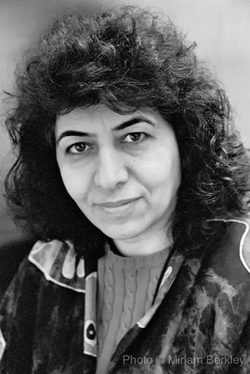1.
I first came across the poetry of Dunya Mikhail in Eliot Weinberger’s New Directions anthology, World Beat. An Iraqi Christian who speaks Arabic, Aramaic, and English, Mikhail ran afoul of the Iraqi authorities because of her writing and left in the 1990s. Her first book in English came out from New Directions in 2005, The War Works Hard. It contains poems translated by Elizabeth Winslow from 2004 as well as Mikhail’s earlier Arabic editions from 1997 and 1993. Born in 1965, Mikhail covers the cataclysms of recent Iraqi history from the Iraq-Iran war and Operation Desert Storm through the years of the sanctions and the end of Saddam Hussein’s regime. According to Saadi Samawe’s introduction, Mikhail’s “imagination is so immense that it embraces and synthesizes layers of literary traditions from ancient Mesopotamian mythology, to Biblical and Qur’anic poetics, to the latest techniques of Western modernism.”
2.
Vietnam veteran Larry Heinemann, from Christian’s Appy’s Patriots: The Vietnam War Remembered from All Sides: “We lost the war because the Vietnamese just flat out beat us. And we lost the war because we didn’t understand that they were poets. That’s true. In 1990, I went back to Vietnam for the first time. There was a literary conference in Hanoi. At one of the lunches I sat next to this little bitty guy who turned out to be a professor of American literature at Hanoi University—Professor Nguyen Lien. I asked him what he did during the war and this is the story he told me. He said that his job was to go to Beijing and learn English and then go to Moscow University to read and study American literature. Then he went back to Hanoi and out to the Ho Chi Minh Trail and gave lectures on American literature to the troops traveling south. It was not like a six-week survey, just an afternoon, but he talked to them about Whitman, Jack London, Hemingway, Faulkner, Fitzgerald. A lot of Vietnamese soldiers carried translations of American literature in their packs. Le Minh Khue—a young woman who worked on the Ho Chi Minh Trail disarming unexploded bombs—carried Ernest Hemingway. Professor Lien asked me this question, ‘Now what Vietnamese literature did the American military teach you?’ I laughed so hard I almost squirted beer up my nose. I told Professor Lien that I would have been surprised if the U.S. Army had given us classes in American literature.”
3.
You can read Mikhail’s title poem in English here. “Bag of Bones” portrays family members searching for the remains of their beloveds, a ghastly scene familiar to other victims of oppression, such as Guatemalans and Bosnians. “An Urgent Call” directly addresses Lynndie England, infamous from the Abu Ghraib scandal. “The Prisoner” will speak to many devastated mothers who find themselves visiting their sons in prison. “Non-Military Statements” includes the following: I thank everyone I don’t love, They don’t cause me heartache; they don’t make me write long letters; they don’t disturb my dreams. I don’t wait for them anxiously; I don’t read their horoscope in magazines; I don’t dial their numbers; I don’t think of them. I thank them a lot. They don’t turn my life upside down.
4.
In his speech last week in Belgium, President Barack Obama offered this take on U.S. relations with Iraq: “Now, it is true that the Iraq War was a subject of vigorous debate not just around the world, but in the United States as well. I participated in that debate and I opposed our military intervention there. But even in Iraq, America sought to work within the international system. We did not claim or annex Iraq’s territory. We did not grab its resources for our own gain. Instead, we ended our war and left Iraq to its people and a fully sovereign Iraqi state that could make decisions about its own future.” I wonder how Dunya Mikhail could respond, poetically, to such an outrageous rewriting of history. Not only does the war work hard; falsehood itself is at work 24/7.

1 Comment